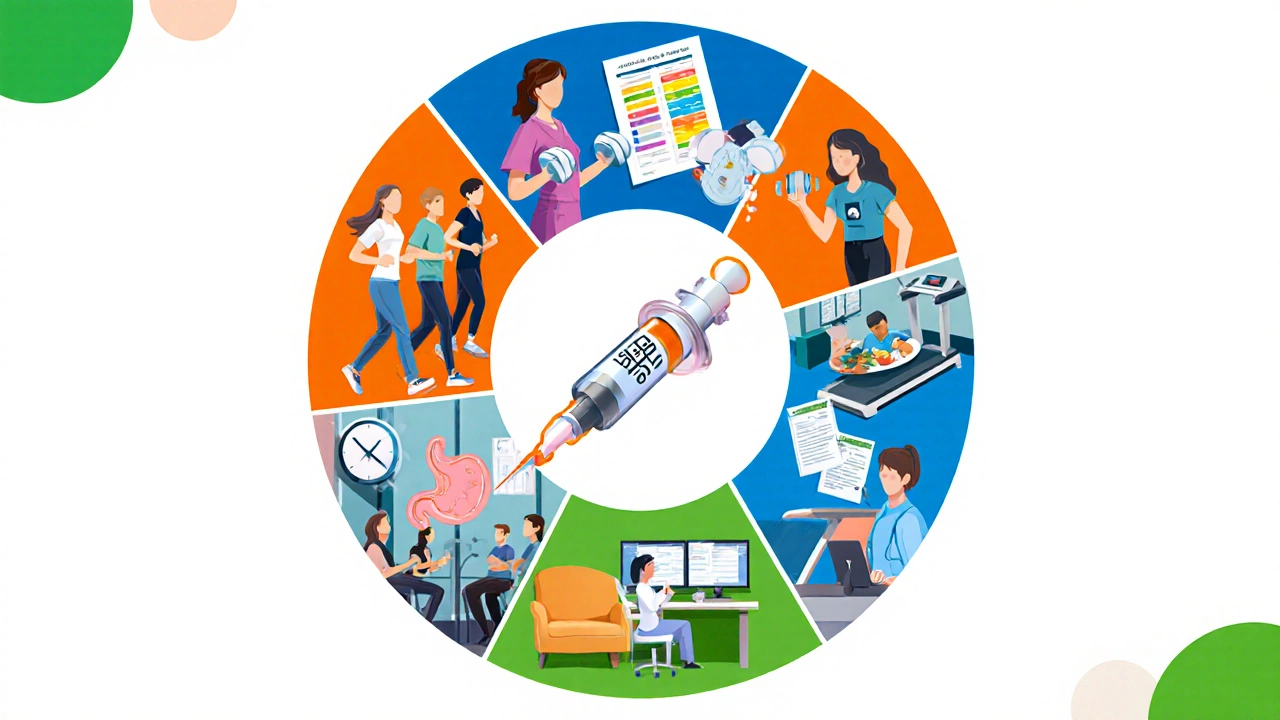Weight Loss Treatment Calculator
Find Your Most Effective Treatment
Answer 4 key questions to get personalized recommendations based on clinical evidence
Personalized Recommendations
Everyone who’s tried to shed pounds knows the frustration of endless diets that barely move the needle. The real question isn’t “how many calories should I cut?” but “what’s the most effective weight loss treatment for my body and life?” This guide breaks down the science, the options, and the decision‑making process so you can stop guessing and start seeing results.
Quick Takeaways
- Effectiveness is measured by sustained weight loss of at least 10% of body weight over 12months.
- Three pillars drive success: behavior change, medical support, and, when needed, surgical intervention.
- PrescriptionGLP‑1 drugs and bariatric surgery offer the highest average loss (15‑30%).
- Intermittent fasting and structured lifestyle programs work well for motivated individuals without medical issues.
- Choosing the right route requires assessing health status, cost, commitment level, and long‑term support.
How experts judge "effectiveness"
When clinicians rank weight loss options they look at four hard metrics:
- Magnitude of loss: Percent of initial body weight shed and kept for at least a year.
- Safety profile: Frequency of serious side‑effects and long‑term health impact.
- Cost‑benefit ratio: Direct expenses vs. health savings from reduced comorbidities.
- Adherence requirements: How much daily effort, monitoring, and lifestyle overhaul the patient must sustain.
These criteria help cut through hype and focus on real outcomes.

Major weight‑loss approaches
Below are the eight most widely recognized weight loss treatments that have been studied in clinical settings and real‑world practice. Each varies in intensity, cost, and suitability.
Lifestyle modification
This is the foundation: personalized diet plans, behavior coaching, and regular monitoring. Programs like Weight Watchers or medically supervised calorie‑counting clinics fall here. The average 12‑month loss hovers around 5‑7% of initial weight.
Medical nutrition therapy
Registered dietitians design macro‑balanced menus (often low‑carb or Mediterranean) tailored to metabolic testing. When combined with regular follow‑ups, patients can achieve 8‑10% loss.
Physical activity
Exercise isn’t a magic bullet, but structured aerobic plus resistance training boosts metabolic rate and preserves lean mass during calorie deficit. Studies show adding 150minutes/week of moderate activity adds roughly 2‑3% more loss.
Prescription weight‑loss medication
Today's top classes are GLP‑1 receptor agonists (e.g., semaglutide, tirzepatide). In phase‑III trials they produced 15‑20% weight reduction over a year, with appetite suppression as the primary mechanism. Side‑effects include nausea, gallbladder issues, and rare pancreatitis.
Intermittent fasting
Time‑restricted eating (e.g., 16/8) or alternate‑day fasting creates a natural calorie deficit while preserving muscle. Meta‑analyses report 5‑9% loss, with adherence rates higher than traditional daily calorie restriction for many people.
Bariatric surgery
Procedures such as sleeve gastrectomy or Roux‑en‑Y gastric bypass physically limit intake and alter gut hormones. Average loss is 25‑30% of baseline weight, sustained over 5‑10years. Risks include surgical complications, micronutrient deficiencies, and the need for lifelong follow‑up.
Psychological counseling
Addressing emotional eating, body‑image issues, and stress management via CBT or mindfulness improves adherence to any other modality. Alone it yields modest 2‑4% loss but dramatically boosts success of combined programs.
Medical weight loss programs
These are clinic‑based services that blend the above-prescription meds, dietitian guidance, and regular labs-to provide a coordinated, insurance‑friendly pathway. Outcomes sit between lifestyle alone and surgery, typically 10‑14% loss.
Comparison of top options
| Treatment | Avg. % loss (12mo) | Typical cost (USD) | Invasiveness | Best for |
|---|---|---|---|---|
| Lifestyle modification | 5‑7% | $0‑$500 (program fees) | None | Motivated beginners |
| GLP‑1 prescription meds | 15‑20% | $1,200‑$1,800 per year | None (injectable) | Patients needing medical support |
| Intermittent fasting | 5‑9% | $0‑$200 (apps/books) | None | Busy adults preferring simplicity |
| Bariatric surgery | 25‑30% | $15,000‑$30,000 (incl. hospital) | High (surgical) | Severe obesity (BMI≥35) or comorbidities |

How to pick the right plan for you
Follow this three‑step decision tree:
- Health screening: Get a baseline labs panel (HbA1c, lipid profile, thyroid panel) and a BMI/waist‑circumference measurement. If BMI≥35 or you have uncontrolled diabetes, surgery or GLP‑1 meds move to the top of the list.
- Commitment audit: Ask yourself how many hours per week you can devote to meal prep, exercise, or clinic visits. If <10hours, start with intermittent fasting or a structured lifestyle program. If you can commit >15hours, consider a combined diet‑exercise‑counseling package.
- Cost analysis: Factor insurance coverage for prescription drugs or surgery. If out‑of‑pocket budget is < $2,000, begin with lifestyle and fasting. If you have coverage for GLP‑1 agents, discuss them with an endocrinologist.
Remember, the most effective weight loss treatment is the one you can sustain. Switching between methods too often erodes metabolic adaptations and can lead to yo‑yo dieting.
Common pitfalls and how to avoid them
- Relying on “quick‑fix” diets: They often cut macronutrients crucial for muscle preservation, causing rebound gain.
- Ignoring micronutrients: Especially after bariatric surgery, supplement iron, B12, calcium, and vitaminD lifelong.
- Skipping professional monitoring: Prescription meds require periodic liver and renal labs; neglect can mask adverse effects.
- Neglecting mental health: Emotional triggers can sabotage even the best plan; short counseling sessions improve adherence by ~30%.
- Setting unrealistic timelines: A safe loss rate is 0.5‑1kg per week; faster rates raise risk of gallstones and muscle loss.
Frequently Asked Questions
Can I lose weight effectively without medication?
Yes. A disciplined lifestyle modification program-balanced diet, regular exercise, and behavioral coaching-can deliver 5‑10% loss in a year. Adding intermittent fasting often boosts results without drugs.
Are GLP‑1 drugs safe for long‑term use?
Long‑term data up to 3years show sustained weight loss and improved cardiovascular markers. Common side‑effects are mild nausea that usually fades. Rare serious events (pancreatitis) require immediate medical attention.
What’s the recovery time after bariatric surgery?
Most patients leave the hospital in 2‑3days. Full activity resumes within 4‑6weeks, but dietary progression from liquids to solids takes about 8weeks under dietitian supervision.
How does intermittent fasting affect muscle mass?
When paired with resistance training and adequate protein (1.2‑1.6g/kg body weight), fasting does not cause muscle loss. Some studies even show modest gains due to improved growth‑hormone spikes during the fast.
Do I need psychological counseling for every weight‑loss plan?
Not mandatory, but highly recommended if you have a history of emotional eating, depression, or past dieting failures. Even brief CBT sessions can unlock motivation and prevent relapse.
Choosing the right path is a personal decision, but armed with clear data and realistic expectations you can move from trial‑and‑error to a sustainable, health‑boosting transformation.
